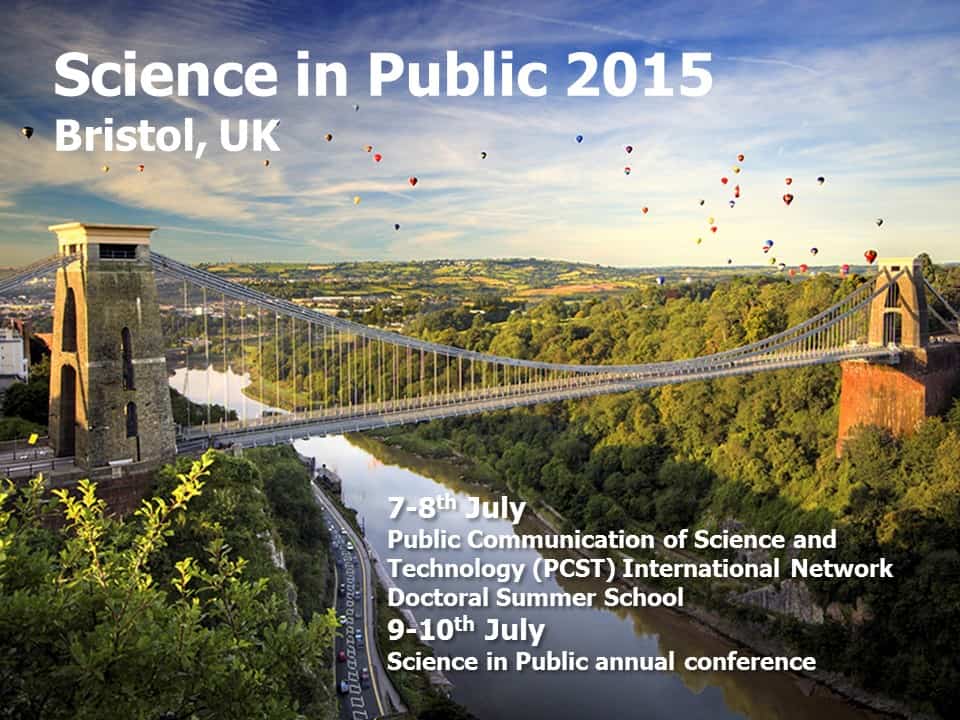
By Margaret Harris
Here’s a Tuesday quiz for you. If you disagree with a colleague about something scientific, what should you do? Your choices are:
(a) Nothing. This is science, and the truth will win out no matter what I do;
(b) Take them aside and explain, privately, why you think they are wrong. Then, if they still disagree with you, get even by writing snarky anonymous reviews of their papers;
(c) Organize a panel “discussion” and tear them to shreds in front of all your colleagues;
(d) Take your case to the public by writing a popular-science book explaining the superiority of your own theory.
Okay, this is a trick question: I’m not sure any of those options is really a good idea (although I’m sure they’ve all been tried). I’d like to focus on the last one, though, because it was the subject of an interesting talk at the Science in Public conference, held last week in Physics World’s home city of Bristol.
In the talk, Kanta Dihal, a DPhil student in science communication at the University of Oxford, presented two examples of physicists making their disputes public. Her first example concerned the 20th-century astrophysicists George Gamow and Fred Hoyle, who backed competing theories of the universe’s origins. Gamow struck first by including a scene in his popular Mr Tompkins books that mocked Hoyle and his “steady-state” model. Later, Hoyle used a series of radio lectures on “The nature of the universe” (later made into a book of the same title) to advocate steady-state theory and rubbish the idea of a “Big Bang”.
Dihal’s second case of what she termed “nerd-on-nerd violence” was a more recent cosmological bunfight. Here, the chief writer-antagonists were Stephen Hawking, who believed (from the 1970s through the mid-2000s) that information is lost when objects fall into black holes, and Leonard Susskind, who argued that information loss would undermine all of quantum mechanics. Hawking’s early views on the subject appear in his 1989 bestseller A Brief History of Time, while Susskind based his entire 2008 book The Black Hole War on his efforts to (as the book’s subtitle puts it) “make the world safe for quantum mechanics”.
Dihal talked about various aspects of these books and their reception with the public, but the comment that really resonated with me was her observation that most popular-physics books have an “obligatory admiration chapter”. This, she explained, is where the authors write about how great Newton and Einstein were and attempt to link their own work (or whatever they’re writing about) to a grand tradition of linear scientific progress.
As Physics World’s reviews editor, I can vouch for the fact that most pop-physics books do indeed include a chapter of this type. And while many authors do a good job with their version of the “obligatory admiration chapter”, and a few even find something fresh to say, there is, unfortunately, a pattern of sameness and shallowness evident in most. Basically, if authors of pop-history books wrote like this, they’d start off with a canned account of world history up to a certain period, throw in some reheated explanations of concepts such as “kings” and “countries”, and only get to their actual subject (which, to complete the pop-science analogy, would be something that’s been written about n times already – the causes of the First World War, perhaps) halfway through the book. Then they’d finish up with a speculative chapter on, say, the Greek debt crisis to give the reader the illusion that they’d spent the previous 300 pages learning about real cutting-edge stuff.
Not all popular physics books fit this pattern, of course. And one could, I suppose, argue that the “obligatory admiration chapter” is partly a function of how little knowledge the book-buying public brings to the table. If your intended reader barely knows what atoms are or who Einstein was, then okay, yes, you need to start with the basics.
But in my experience, most pop-physics authors aren’t really writing for that audience (and if they are, they’re doing it wrong). More often, their ideal reader seems to be more like someone who was okay at science in high school, decided to study something else at university, and now wants to know what they missed. And I think people like that deserve a better, more nuanced and, yes, more challenging picture of what physics is really like – conflicts, uncertainties and all.



